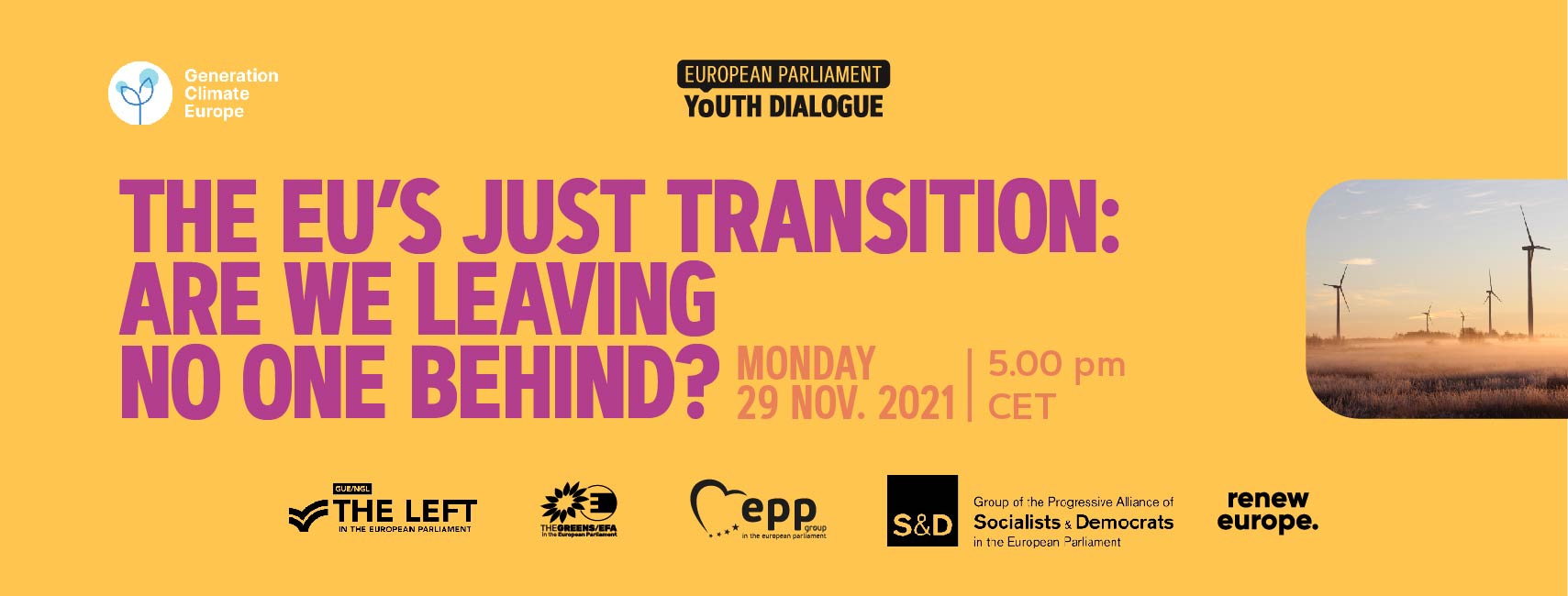By Lorenzo Manca
The Just Transition: Making the Green Deal work for all
In our next debate on Monday 29 November 2021, 17:00 CET, we will focus on how climate justice is being implemented within the EU. The European Green Deal has provided so far for several policy measures aiming to cut the emissions of the EU 27 bloc and make its economy fit to become sustainable and circular. New sectors are being promoted, like renewable energy, alternative fuels and digital technologies. These will create a brand-new economy, but also inevitably bring to close down entire existing sectors, especially those linked to the production of fossil fuels like coal and oil. Since these sectors currently employ hundreds of thousands of people around the EU, the European Green Deal also aims to achieve a just transition, where those people will find a place in the new economy rather than just being left behind. The debate will focus on the main tool that should achieve that, the Just Transition Mechanism and, within that, the Just Transition Fund.
Leaving no one behind?
The Just Transition Mechanism is a set of three tools, or “pillars”, from the EU 2021-27 budget that are expected to mobilise around EUR 65-75 billion to reshape the economy of fossil fuel producing regions, which in Europe essentially equals coal mining regions. The three pillars are the Just Transition Fund, Invest EU, and the Public Sector Loan Facility. The pillars will draw resources from the EU budget, Next Generation EU and the European Investment Bank to promote green energy, sustainable investments and the reskilling of workers to reshape the economy of coal producing regions and help them integrate in the green economy. The motto of the package is “leaving no one behind”, but will it be able to deliver on what it promises? That is what we will address in our third Dialogue.
Leaving coal behind: the herculean challenge
With Member States such as Poland generating 80% of their energy from coal and employing tens of thousands of people in coal mining, phasing out this fossil fuel already appears to be an extreme challenge for the EU. The central tool to tackle it is going to be the Just Transition Fund (JTF), launched with the EU 2021-27 budget and officially implemented in July 2021. The JTF has been endowed with EUR 19 billion to lead the way by financing the Territorial Just Transition Plans that member states are preparing for their fossil fuel producing regions. It will fund start-ups, reskilling activities, green investments, research, and social projects. The other two pillars of the Just Transition Mechanism are supposed to complement this action by financing green projects from private and public actors on the side. The quotas of JTF funding will benefit mostly those Member States with the biggest coal producing regions, with the Top 3 being Poland (20% of total funding), Germany (13%), and Romania (11%). Member States are expected to prepare their Territorial Just Transition Plan in consultation with the civil society, local authorities, and the European Commission. The Commission itself will then review the plans and approve funding. This process started early in 2021, but since its inception, NGOs like Bankwatch have reported that plans are generally unambitious regarding emissions cuts and the phasing out of coal. Besides, only for a few plans has civil society been engaged, while the coal industry has been a privileged interlocutor so far.
The disappointing state of things of the Just Transition Plans is everything but surprising, and it is not the best start for a transition that should be aimed at ensuring those communities will have a new future. We – the young people – will be the ones who will experience this future. We can only accept the highest level of ambition, engagement and commitment from our governments. The debate with the Members of the European Parliament will be a chance to highlight how our representatives can make sure Member States do not waste the opportunity to reduce inequalities within and between generations.
Don’t forget to take part in our Dialogue – The EU’s Just Transition: Are we leaving no one behind? – on 29 November!
Watch the event on Facebook, YouTube, and LinkedIn! Register here to ask a question!
Visit our page to learn more about our European Parliament Youth Dialogues!

